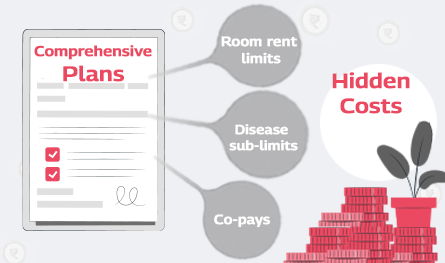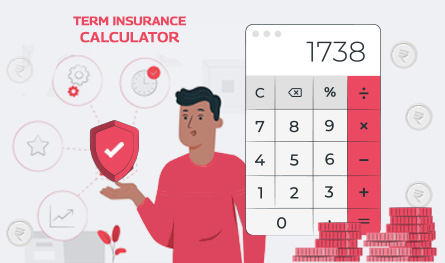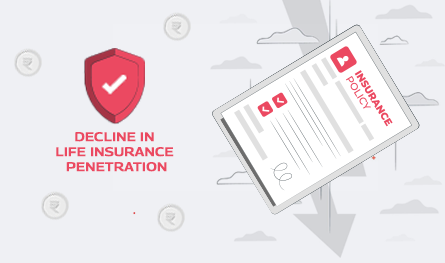Hidden Costs in Comprehensive Coverage: 5 Traps to Avoid

You have finally done it – you have bought a comprehensive car insurance plan to cover your prized vehicle, thinking it’s the golden ticket to complete peace of mind. “I am covered for everything”, you might say, confidently revving up your engine. But what if we told you there is more than meets the eye?
If you have ever filed for an insurance claim, chances are you have noticed that the payout was not quite what you hoped. Car insurance hidden charges can sneak up like a speed bump on a rainy night – annoying, unexpected, and definitely something you would prefer to avoid. This article will go over the top 5 hidden traps that could be nibbling away at your car insurance – and how to steer clear of them.

Top 5 Hidden Costs in Car Insurance
You may have noticed your premium creeping up, or maybe your claim amount didn’t match what you thought you were entitled to. Just because your car insurance plan is called “comprehensive” does not necessarily mean it is completely transparent. “Comprehensive” does not always mean clear-cut. Underneath all that coverage could be some clever fine print that adds a few unexpected costs to your policy.
Here is a list of the top 5 car insurance hidden charges:
- Sneaky Deductibles and Voluntary Excess
You probably saw the word “deductible” in your policy but skimmed past it. Most people do. But here is the deal: a deductible is the amount you have to pay yourself before your insurance starts covering the rest. There are two types - compulsory (set by the insurance provider) and voluntary (chosen by you for a lower premium). If you don’t pay attention, you could be in for a shock when your claim gets approved, and you realise you are paying more of the bill than expected. - The Add-on Avalanche
You can go a little overboard when shopping for car insurance riders. You want everything ranging from roadside assistance, zero depreciation, to complete engine protection, and suddenly your premium ballooned like a hot air balloon in festival season. While some add-ons are useful, overloading your policy with every shiny feature available can quietly inflate your premium. Always assess what you actually need versus what sounds cool in the brochure. - Depreciation Clauses
Think your full insurance coverage includes the total replacement value of your parts? Think again. Most motor insurance policies factor in depreciation, so your claim payout for damaged parts could be way less than their original cost. Unless you have a zero-depreciation add-on, you will have to cover the shortfall. If you do decide to get the rider, please note this will increase your premium to some extent. - Engine and Gearbox Coverage Isn’t Always Included
Even in comprehensive plans, damage to your engine or gearbox due to water ingress or oil leaks may not be covered unless you have a specific add-on. So, if you live in a flood-prone area or love long monsoon drives, check if you are covered or risk an expensive repair bill. You can always get an add-on to cover this specific need. - Renewal and Cancellation Fees
Whether you are renewing your policy a bit late or cancelling it mid-term, insurance providers might charge processing fees you did not see coming. These costs are usually tucked away in the fine print, making them easy to overlook. So, before you change your plan or skip renewal reminders, be sure to check what fees might be waiting for you.
Tips to Keep in Mind
If you want your motor insurance to genuinely go the distance for you, it's time to look beyond the brochure. Here is the list of a few pointers to keep in mind when buying motor insurance:
- Read the Fine Print: Do not rely on assumptions. Take time to understand each section of your policy.
- Ask Questions: When in doubt, ask your insurance provider like it is a job interview. It is your money on the line.
- Compare Smartly: Do not just look at premiums—compare features, exclusions, and service track record.
- Customise, Don’t Overbuy: Choose add-ons that suit your driving habits and car usage. A city driver does not need the same coverage as someone doing cross-country trips.
- Revisit Your Policy Annually: Life changes, and so should your insurance. Review and adjust each renewal.

Author Bio
Paybima Team
Paybima is an Indian insurance aggregator on a mission to make insurance simple for people. Paybima is the Digital arm of the already established and trusted Mahindra Insurance Brokers Ltd., a reputed name in the insurance broking industry with 17 years of experience. Paybima promises you the easy-to-access online platform to buy insurance policies, and also extend their unrelented assistance with all your policy related queries and services.
Other Motor Insurance Products
Latest Post

Let’s be honest – life insurance planning isn’t exactly someone’s weekend hobby. It is the financial equivalent of flossing: we understand its importance, but we tend to put it off. But somewhere between balancing work and life, you might realise you need to have a solid plan in place – just in case.


Getting older is a mixed bag. On one hand, you have experience, wisdom, and the ability to spot and avoid a telemarketing scam from a mile away. On the other hand, your back makes creaking noises when you get out of bed.


As any parent will tell you, kids come with two things: endless energy and absolutely no sense of self-preservation. From scaling chairs and tables like mountaineers to catching germs within a five-mile radius, kids really know how to keep everyone on their toes. Now, it is understandable you are worried. As much as we would love to wrap our small ones in cotton wool and keep them safe forever, real life has other plans.


When was the last time you thought about getting a life insurance policy? If your answer is “I will get to it someday”, you are not alone. Despite India growing as one of the fastest expanding economies, life insurance penetration across the nation has remained surprisingly low. Life insurance penetration fell slightly to 2.8% in FY24, down from 3% in the previous year.

Let’s be honest, your health does not come with a warning sign. One moment you are enjoying your breakfast, and maybe in the next, you're staring at a hospital bill that looks like a phone number. This is why having solid medical insurance is not a luxury anymore. It is your financial shield, your plan B, and your peace of mind, all rolled into one.






 Car Insurance
Car Insurance
